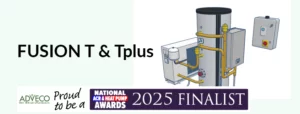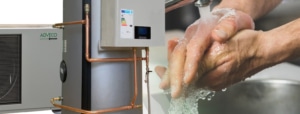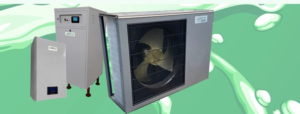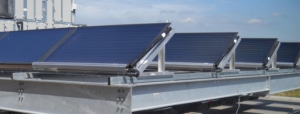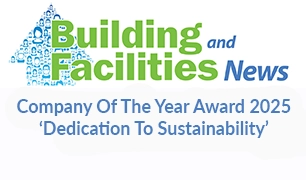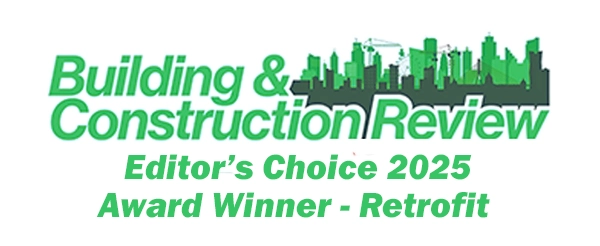Low Carbon and Renewable Water Heating for Leisure & Recreation
Design, Supply and Service of Hot Water for Leisure & Recreation
Adveco Supports:
Hot water plays an important daily role in the leisure and recreation sector, providing enjoyable experiences for visitors, from accommodation, eating & drinking, to hygienic leisure facilities.
Typical water heating applications developed and supplied by Adveco encompass:
- Health and Wellness: The demand for fitness centres, spas, and wellness experiences remains strong. Maintaining small pools, jacuzzi, spa pools, hot tubs, steam rooms, and hydrotherapy treatments all rely on a consistent supply of hot water with precise temperature control for guest comfort and safety.
- Out-of-Home Entertainment: Cinemas, theatres, theme parks, and other entertainment venues are primarily driven by basin and washroom-led demand.
- Accommodation & Guest Facilities: Hotels, holiday parks, and campsites all require a steady supply of hot water for showers, baths, sinks, and laundry facilities.
- Arts and Cultural Centres: Museums, galleries, theatres, clubs and live music continue to attract visitors, again requiring basin and washroom-led demand in front of house.

Talk to us today about:
- Meeting domestic hot water (DHW) demands with commercial gas and electric water heaters, boilers, cylinders, packaged plate heat exchangers and electric immersion kits.
- Commercial heating support with ranges of floor-standing and wall-hung gas boilers, carbon steel heating buffers and thermal storage.
- Addressing sustainability through the integration of solar thermal, Air Source Heat Pumps (ASHP) and boxed heat recovery.
- Smart control systems for increased efficiency and managed transition via hybrid approaches that extend the life of viable systems while addressing the need to reduce carbon.
- Bringing all these varied elements together is Adveco’s packaged plant room offering, a bespoke prefabricated system build that makes full use of vacant space whilst leveraging all the advantages of offsite construction for hybrid and all-electric hot water and heating applications.

Balancing Sustainability with Guest Needs
A large proportion of hot water systems developed for the leisure sector are bespoke due to complexity and a wide set of variables.
Demand fluctuation is at the core of these variables where leisure facilities often experience peak hot water demand during specific periods. Selecting a system that can handle these fluctuations effectively is crucial. So too is maintaining high water temperatures in an application to prevent the growth of Legionella bacteria.
The facilities’ size and layout will also introduce variables, especially as some hot water systems may require more space or have very specific requirements, such as gravity flow in solar thermal systems. Leisure facilities must also comply with relevant building and plumbing regulations regarding hot water provision, including consideration of the environmental impact, not just of combustion emissions, but also noise and even the look and size of a system in consideration of the local environmental impact. As a result, several methods can, or will need to be used to deliver hot water in the leisure sector, each with its advantages and considerations:
Larger leisure facilities traditionally opted for centralised gas or oil-fired boilers for bulk hot water generation. Not only high maintenance, these systems also contribute to carbon emissions and are increasingly at odds with corporate social & environmental responsibilities that distinguish customer offerings in a market increasingly interested in eco-friendly tourism and leisure activities that prioritize ethical practices and responsible sourcing.
Existing sites with a gas connection may continue to use gas water heaters, with the latest generation offering greater efficiency for lower energy consumption, curbing emissions and lowering fuel costs. However, new builds will be unlikely to receive a gas connection and instead be expected to use a mix or direct electric heating and renewables.
Electric boilers and water heaters offer cleaner operation. In the past, their efficiency did not compare well to gas, but that has shifted and the latest generation of appliances offer a wealth of choice in terms of efficient heat output, resiliency and improved controls. Combined with an indirect cylinder for thermal storage and basic controls, an all-electric system can be compact and easy to install in existing spaces.
Direct electric water heating is reliant on the grid where prices can be volatile, and remain considerably higher than that of gas. For this reason, electric boilers are often deployed as a source of top-up heating within a system to achieve safe operating temperatures (+60°C to counter threats of Legionella) and address peak demands.
Within these new hybrid systems, ‘renewables’ are the popular choice for supplying the pre-heat into a system. Currently, two key technologies are proven and most likely to be specified for leisure facilities. These are solar thermal and air source heat pumps.
Live Metering – The most cost-effective and efficient path to sustainability for leisure.
If you need assistance with a system for your Leisure or Recreational facility, then Adveco’s Live Metering service is for you. Live Metering requires an Adveco engineer to visit your site and install a water meter to provide hot water temperature monitoring for verified water data and comment on the risk of the existing system.
Adveco will return within the month to collect the meter. During these visits we can confirm space and clearances, and installation suitability, and once we have analysed the data give a truly accurate sizing and emissions/costs calculation.
- Quick, non-evasive temporary installation
- Visual site assessment & reporting by Adveco engineer
- Consistent 6 minute data 24 hours per day on existing hot water systems
- 50% of monitoring fee deducted if system recommendation purchased from Adveco
- Bespoke theoretical hot water modelling optimised to work with a building’s existing electrical supply
- Daily & annual hot water demands
- Annual estimated energy consumption
- Annual estimated carbon emissions
- Annual estimated operational costs
Adveco can then advise on a new hot water system which meets the demands of a building while increasing efficiency, lowering carbon emissions, and managing costs.
Heat Pumps for Leisure & Recreation
ASHPs work most efficiently when working with lower temperature water, which means whilst excellent for underfloor heating in new builds, they can struggle to achieve commercial hot water temperatures unless more electricity is pushed through the appliance leading to rising operational costs as efficiency drops.
As a result, ASHPs are best used as a source of preheat, working with the cold flow to generate consistent working flow temperatures of 50°C. Adveco will typically advocate the use of a heat pump with an indirect cylinder and an electric boiler to maximise the availability of hot water, significantly reduce carbon emissions, minimise energy demands and better control operational costs.
ASHPs are well-suited for hotels and resorts with moderate to high hot water demands, particularly for new builds or renovations. Spas with consistent hot water needs for showers, saunas, and steam rooms can also benefit significantly from the efficiency and sustainability of ASHPs. While ASHPs can contribute to pool heating, they will not be the sole solution, especially for larger pools. Combining them with a gas boiler or solar thermal system will be a viable approach. A combination of ASHP, solar thermal and electric boiler, though more complex, can be shown to confer key operational savings that mitigate initial system costs and maximise carbon emission reduction.
Related Products

AIR SOURCE HEAT PUMPs
Solar Thermal for Leisure & Recreation
These systems harness solar energy via collectors and a solar fluid, which transfers heat to water, offering a renewable and environmentally friendly solution.
With excellent sustainability credentials based on well-understood and easy-to-maintain technology, solar thermal has experienced a resurgence in popularity. Compared to solar PV, which generates electricity, solar thermal is considerably more efficient when applied to water heating, meaning less roof space is required for fitting panels. Reliance on sunlight does impact efficiency across the year. However, a well-designed system can still potentially meet all your hot water demands during the summer months, whilst continuing to supply some preheat throughout the darker winter months.
Solar thermal in the UK can be expected to supply on average 30% of the annual energy demands for hot water offering considerable carbon savings and offsetting electricity costs.
As a result of current higher grid electricity costs solar thermal payback periods have reduced considerably, making the technology increasingly attractive. Its silent operation is also a particular advantage for many leisure functions.
Related Products
Electric Water Heating for Leisure Buildings
Electric boilers and water heaters help to meet the demands being made of the leisure sector to cut carbon emissions in line with net zero strategies. Increasingly less reliant on fossil fuels for generation, using the electricity grid is increasingly being specified as a cleaner energy source for water heating. Whether new build or the transformational refurbishment of existing commercial buildings, electrically powered systems provide an efficient, futureproof means for delivering fast, efficient heating for domestic hot water production or central heating needs.
Adveco appliances support a range of projects with wall-mounted and floor-standing systems to cater to the wide needs of leisure buildings. Packaged hybrid electric systems also offer a more compact, resilient, fast-to-install and easier-to-maintain alternative for those wishing to avoid a reliance on gas energy supplies.
Related Products
Gas Water Heating for the Leisure Sector
Leisure buildings with large hot water demands and an existing gas connection may continue to take advantage of this lower-cost energy resource to heat water. Whilst strongly urged to adopt a more environmentally friendly approach to heating a building’s water, many leisure organisations will still find value in remaining on gas. With minimal disturbance for business continuity if replacement is required, manageable capital investment and low operational costs this familiar technology remains a popular replacement option when older appliances fail.
For buildings already on the gas network and seeking to gain lower carbon status, replacement gas-fired appliances working in conjunction with heat pumps or solar thermal provide a familiar, practical, highly effective means for offsetting gas demands to lower carbon emissions of legacy gas-only water heating systems.
Adveco supports commercial leisure projects with the latest generation of condensing gas water heaters. Harnessing cutting-edge materials, production and energy management technology, it is now easier than ever to maximise fuel use, cutting energy demands, running costs and carbon emissions. All new gas water heaters are also able to support future gas sources with up to 20% blended hydrogen without any alteration. This makes gas water heaters an excellent bridging technology for existing buildings, future-proofing systems in preparation for potentially larger investment decisions in the future as the nationwide net zero strategy is finalised.
Related Products
- The UK leisure market is a vibrant and ever-evolving sector encompassing a diverse range of activities and experiences which, pre-pandemic was valued at more than £130 billion.
- Despite the impacts of COVID-19, the sector is on track to reach pre-pandemic levels by 2025.
- According to VisitBritain, in 2022, domestic tourism trips have already exceeded pre-pandemic levels, reaching 61.4 million.
- The wellness sector continues to show growth, alongside an estimated 10.3 million gym members The expansion across the sector is helping to drive a projected growth rate of 3.8% annually through to 2027

Talk to us today about:
- Meeting domestic hot water (DHW) demands with commercial gas and electric water heaters, boilers, cylinders, packaged plate heat exchangers and electric immersion kits.
- Commercial heating support with ranges of floor-standing and wall-hung gas boilers, carbon steel heating buffers and thermal storage.
- Addressing sustainability through the integration of solar thermal, Air Source Heat Pumps (ASHP) and boxed heat recovery.
- Smart control systems for increased efficiency and managed transition via hybrid approaches that extend the life of viable systems while addressing the need to reduce carbon.
- Bringing all these varied elements together is Adveco’s packaged plant room offering, a bespoke prefabricated system build that makes full use of vacant space whilst leveraging all the advantages of offsite construction for hybrid and all-electric hot water and heating applications.
Leisure & Recreation News
Getting Started With Sustainable Hot Water Systems
IAQ in Commercial Buildings
Public Sector Decarbonisation Latest Funding Phase
Sink or Basin-led Projects Go Low Carbon
Low-Carbon Hot Water: A Blended Approach
All Electric ? Sustainability & Water Heating Pt.3
Using The Sun – Sustainability & Water Heating part 2
Sustainability & Water Heating
Noise Pollution – What You Need To Hear















